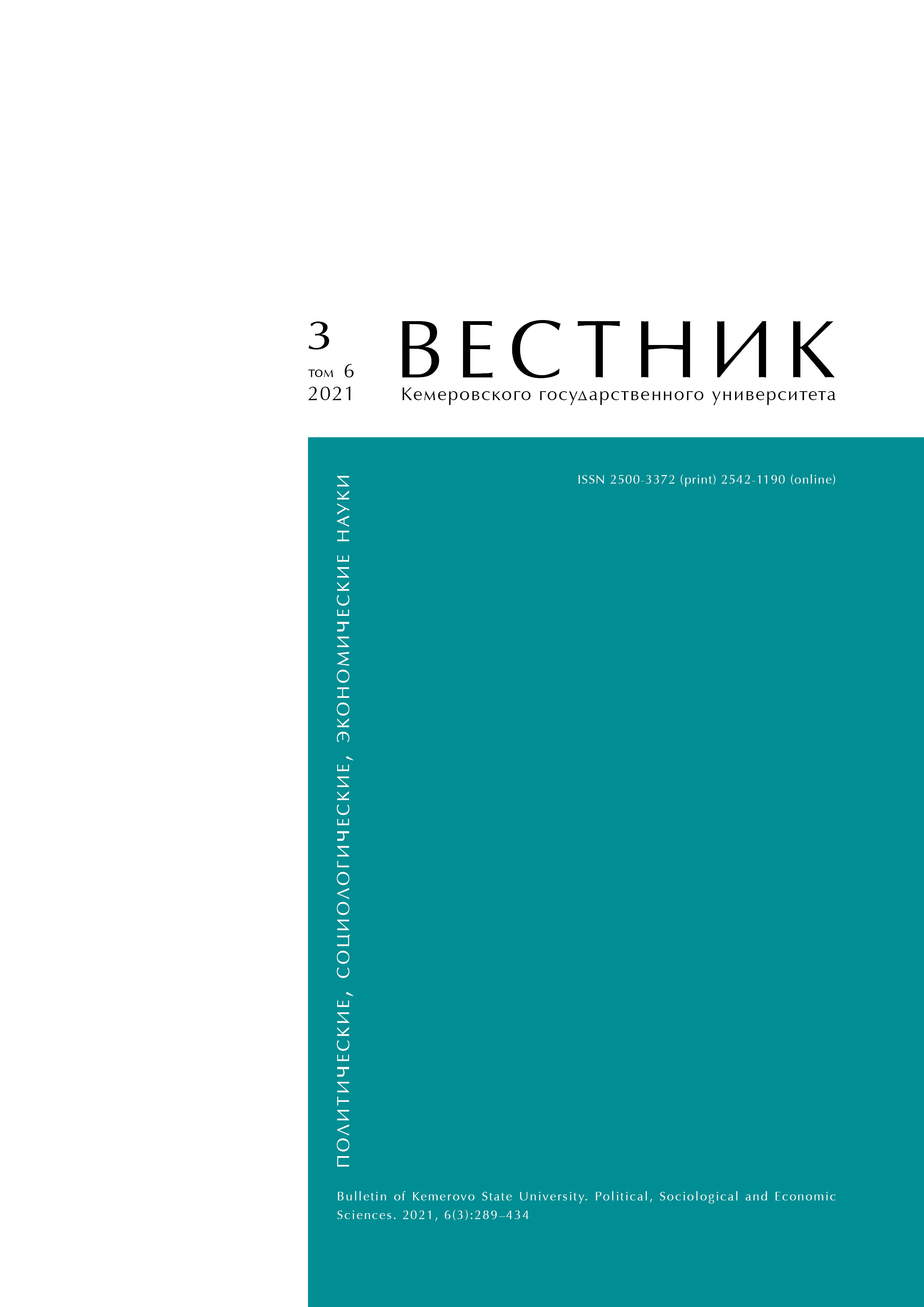Penza, Penza, Russian Federation
Penza, Russian Federation
UDC 33
Globalization has turned Russian industrial cities into intercultural hubs that attract migrant workers. Organizations with multinational personnel need to provide their foreign employees with adaptation procedures and professional training. Multinational teams perform better when social distance is small and interaction is more vivid. The research objective was to substantiate the need for multinational organizations to use a system of adaptation and vocational training, as well as to describe the expected effect of such measures. The article introduces some practical recommendations for improving and forecasting the corporative performance based on the cultural profile of human resources. The forecasting method relies on the quantitative expression of qualitative indicators of personnel management in order to determine the regression dependency of the performance from the initial processes of personnel management. The paper also describes the adaptation and training features of foreign personnel, the current state of adaptation and personnel training in multiethnic organizations, and the optimal levels of management indicators that affect the intermediate performance of such organizations.
multiethnic personnel, social adaptation, intercultural communication, cross-cultural training, mentoring, efficiency
1. Korabelnikova L. Ch., Savchik M. K. The problem of the impact of socio-cultural adaptation of foreigners on the effectiveness of the learning process. Language. Society. Medicine: Proc. XIX Republican Student Conf. with Intern. Participation and XVI Republican Sci.-Prac. Semi-nar "Formation of intercultural competence in higher education institutions when teaching languages", Grodno, 14 Nov 2019. Grodno: GrGMU, 2020, 265-267. (In Russ.)
2. Amosova O. K. Socio-cultural adaptation of a foreigner as a form of interaction with new reality. The socio-cultural environment of the university and the linguistic development of the personality of a foreign student: Proc. Intern. Sci.-Prac. Conf., Moscow, 7-9 Nov 2019. Moscow: RGU im. A. N. Kosygina, 2019, 56-57. (In Russ.)
3. Bessonova M. A. Features of adaptation of multinational staff in the company. Ekonomika i menedzhment innovatsionnykh tekhnologii, 2016, (11): 73-76. (In Russ.)
4. Ushkin S. G. Host community and foreign migrants: regional adaptation practices. Administrative consulting, 2019, (12): 191-201. (In Russ.) https://doi.org/10.22394/1726-1139-2019-12-191-201
5. Dietz B. Migration in der Ukraine: hintergründe und trends (ergebnisse einer haushaltsbefragung). Kurzanalysen und Informationen. Regensburg: Osteuropa-Institut Regensburg, 2007, iss. 29, 8.
6. Vasin S. M., Prokhorova Yu. E. Features of adaptation of staff of a multinational corporation. Creative economy, 2017, 11(8): 847-854. (In Russ.) https://doi.org/10.18334/ce.11.8.38223
7. Gudykunst W. B., Lee C. M., Nishida T., Ogawa N. Theorizing about intercultural communication. Thousand Oaks: Sage Publications, 2005, 3-32.
8. Berry J. W., Annis R. C. Acculturative stress: the role of ecology, culture and differentiation. Journal of Cross-Cultural Psychology, 1974, 5(4): 382-406. https://doi.org/10.1177/002202217400500402
9. Moumita N., Zaman L. An analysis of global training and experience sharing in multinational companies. American Journal of Business and Management, 2013, 2(1): 75-83. https://doi.org/10.11634/216796061706274
10. Oberg K. Cultural shock: adjustments to new cultural environments. Practical Anthropology, 1960, os-7(4): 177-182. https://doi.org/10.1177/009182966000700405
11. Triandis H. C., Malpass R. S., Davidson A. R. Psychology and culture. Annual Review of Psychology, 1973, 24: 355-378. https://doi.org/10.1146/annurev.ps.24.020173.002035
12. Kealey D. J. A study of cross-cultural effectiveness: theoretical issues and practical applications. International Journal of Intercultural Relations, 1989, 13(3): 387-428. https://doi.org/10.1016/0147-1767(89)90019-9
13. Smolina T. L. Symptoms of culture shock: overview and classification. Psihologicheskaya nauka i obrazovanie psyedu.ru, 2012, (3). Available at: http://psyedu.ru/journal/2012/3/3028.phtml (accessed 3 Sep 2021). (In Russ.)
14. Ward C., Kennedy A. Coping with cross-cultural transition. Journal of Cross-Cultural Psychology, 2001, 32(5): 636-642.
15. Prokhorova Yu. E. Development of staff in multinational organizations as a basis for its effective functioning. Nauchnye gorizonty, 2018, (9): 39-44. (In Russ.)
16. Soltitskaia T. A. Cross-cultural aspects of personnel management. Vestnik Sankt-Peterburgskogo universiteta. Menedzhment, 2002, (3): 51-70. (In Russ.)
17. Thomas A. Analyse der Handlungswirksamkeit von Kulturstandarts. Psychologie interkulturellen Handelns, Hrgs. Thomas A. Göttingen, Bern, Toronto, Seattle: Hogrefe, Verlag für Psychologie, 1996, 107-135.
18. Byram M. Teaching communicative and intercultural competence. Lend - lingua e nuova didattica, 2013, XLII(2): 34-43.
19. Caligiuri P. Developing global leaders. Human Resource Management Review, 2006, 16(2): 219-228. https://doi.org/10.1016/j.hrmr.2006.03.009
20. Schilcher C., Poth A.-K., Sauer S., Stiefel K.-P., Will-Zocholl M. Trust in international teams: cultural, spatial, and organizational issues. International Journal of Business Research, 2011, 11(4): 29-38.
21. Black J. S., Mendenhall M. Cross-culture training effectiveness: a review and theoretical framework for future research. Academy of Management Review, 1990, 15(1): 113-136. https://doi.org/10.2307/258109
22. Ragins B. R., Cotton J. L., Miller J. S. Marginal mentoring: the effects of type of mentor, quality of relationship, and program design on work and career attitudes. Academy of Management Journal, 2000, 43(6). https://doi.org/10.5465/1556344
23. Masalimova A. R. Modern tutors competencies model. Professional Education in Russia and Abroad, 2012, (4): 104-108. (In Russ.)
24. Kozhevnikova O. A. A new look at the role of mentoring in organizations. Sborniki konferentsii NITs Sotsiosfera, 2014, (61): 235-238. (In Russ.)
25. Vasin S. M., Prokhorova Yu. E. Methods of evaluation of the personnel management processes of multinacional organizations. CITISE, 2018, (1). Available at: https://ma123.ru/ru/2018/04/методика-оценки-процессов-управлени/ (accessed 3 Sep 2021). (In Russ.)

















